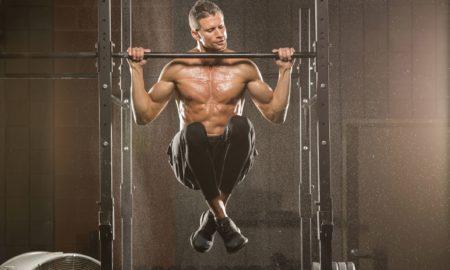I once watched Mike Mentzer train his abdominals. As regular IRON MAN readers know, Mike was an advocate of high-intensity training, or HIT—short, high-intensity, low-volume workouts spaced out to encourage maximum muscle recovery between training sessions. That day Mentzer did situps over a bench while holding a 100-pound plate against his chest. He did about eight reps per set and did three sets total. Mike believed that you should train your abdominals the same way you would train any other muscle, and that’s precisely what he did.
The prevailing style of training abs frequently with high reps didn’t make sense to Mentzer. He correctly pointed out that the amount of fat in your midsection, or more precisely the existence of muscular definition, was more related to diet and aerobics than to ab work.
Some suggest that abdominal training is superfluous—and there’s some truth to that idea. I once observed Casey Viator change from having zero abdominal definition to a pronounced six-pack merely from dieting alone; he did zero direct-abdominal exercise. Conversely, you can train your abs with thousands of reps daily yet still not have six-pack abs unless you adjust your diet. The notion of spot reducing is clearly a myth, since the body burns fat systemically rather than in one particular area.
There are a number of good reasons that you should train your abdominals. It helps maintain proper posture. It helps protect your lower back from injury by stabilizing your lumbar muscles. Many people walk around with chronic back pain because their protruding abdomens—usually caused by a combination of weak ab muscles and fat—result in a lordosis, or inward curvature, of the lower back, which places constant strain on the area.
The question that arises then is how to best train the abs. One way is to examine the muscle fiber ratio of the abs. The rectus abdominus (I once referred to them as the “rectum abdominus,” causing a lot of guffaws in the gym. My excuse was that I was 12 years old at the time) consists of 55 to 58 percent slow-twitch, or endurance, muscle fibers. Since they’re slow to fatigue, it would appear that the long-held bodybuilding practice of doing higher reps for abs may have some basis in fact. The abs, however, also contain 15 to 23 percent type 2A fast-twitch fibers and 21 to 28 percent type 2B fast-twitch fibers. Those are the strength fibers and won’t be significantly affected by higher reps. To work them, you need to add weight, as Mentzer did. That way you’ll develop thicker abdominal muscles.
Can you also strengthen your abs without using any weight? That question was examined in a recent study that featured 71 men and women, age range 19 to 40, who were divided into groups depending on how often they trained their abs. The frequencies ranged from zero to three to six days a week. The subjects did a variety of traditional ab exercises, such as crunches, for 11 weeks. The researchers found that, regardless of frequency, training the abs without adding weight doesn’t produce strength increases. That isn’t surprising—muscle grows only when resistance is added.
That’s the whole point of weight training and explains why you can build muscle by lifting weights but not by doing calisthenics. The authors underscore Mentzer’s philosophy by noting that training to failure is more effective in producing strength gains. Doing high reps without weight, as is the usual practice in ab training, rarely if ever involves training to failure, although it often involves a failure to train. The study also found that it made no difference whether you trained abs three or six days a week, meaning that those who insist on training their abs daily with high reps are engaging in what amounts to self-flagellation. If you want stronger and thicker abs, you need to use weight. End of discussion.
—Jerry Brainum
www.JerryBrainum.com
Pintar, J.A., et al. (2009). Traditional exercises do not have a significant impact on abdominal peak force in healthy young adults. J Strength Cond Res. 23:2083-2089.




















You must be logged in to post a comment Login